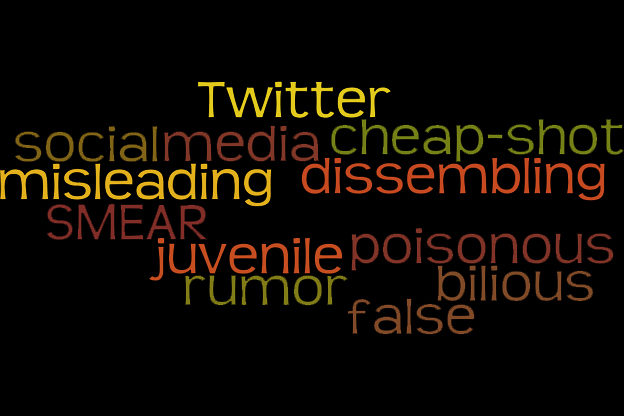

The anatomy of a smear
If a person — such as myself — posts information favorable to Senate candidate Richard Painter — or @RWPUSA, as he is known on Twitter to his 500,000 followers, for example — it won’t be long before this is thrown at you, often with a bilious and puerile demand for an apology. You can check my own Twitter threads at @stevetimmer for a recent example. That’s where I got the image, but I’ve seen it around, always presented just this way.

Painter advocates for Garland (via www.nytimes.com)
In addition, multiple people, including Rep. Jim Davnie, former and hopeful Rep. Ryan Winkler, and some well-known activists, too, have tweeted, and probably written elsewhere, that Painter had a “major role” in the nomination and confirmation of Roberts and Alito.
Because of the way that the screenshot is clipped, it doesn’t show the whole title to the NYT article, nor is a link provided. Here it is:
Bush Would Have Nominated Garland
When one reads the whole title and the whole opinion piece itself from March ’16 in the New York Times, it is readily apparent that the screenshot doesn’t tell the whole story. Painter was writing that Merrick Garland should get a hearing and confirmation if Republicans were smart because if the Republicans lost the presidential and Senate elections in the fall, they could face a nominee they’d like a lot less. (We know now that the Republicans rang the bell in November, but we didn’t know that in March.)
In other words, he was advocating for confirmation of an Obama-nominated Supreme Court justice candidate.
Candidate Painter has also written about his time in the White House as ethics counsel in the About section of his campaign webpage:
2005-07 — Took a leave of absence from teaching at the University of Illinois College of Law to serve as Associate Counsel to the President and chief White House ethics lawyer. The White House ethics lawyer’s job is not a policy or political job. The fact that Mr. Painter often disagreed with the policy preferences of the contemporary Republican Party was irrelevant. His consistent theme for decades has been that ethics is not political.
2007 — Begins teaching corporate law and legal ethics at the University of Minnesota. His wife Karen Painter becomes a professor of musicology in the School of Music.
As an aside, I would observe that if ethics becomes political, it isn’t ethics anymore: it’s politics.
I encourage you to go and read this entire section of the website and read about Richard’s activities in public life since 1980. He got and took the job as ethics lawyer in the Bush administration because of an already-existing national reputation in the field of ethics.
His job was to screen nominees to high office for ethical problems and conflicts of interest, not make policy choices. Painter told Hank Paulsen to divest himself of his holdings in Goldman Sachs before he became Treasury Secretary. That must have smarted.
Parenthetically, ethics and conflicts of interest can be a snare for even sitting Supreme Court Justices. Just ask Abe Fortas and LBJ.
Contrast that with Tina Smith whose family owns millions in medical device stocks while she advocates for the elimination of the medical device tax, which helps fund Medicaid. (Richard wants to keep it, by the way.)
At the risk of repeating myself, Richard Painter was not a policy lawyer in the White House. (The Federalist Society picks Republican judicial nominees, anyway; we all know that.) Lawyers, perhaps even Ryan Winkler, will tell you that clients sometimes, maybe even often, take actions you don’t agree with as a matter of policy. Conversely, I’ve had clients over the years who knew and disagreed with my politics but hired me anyway because they trusted my advice.
If you are an apologist for the Smith campaign and DFL operatives, you might want to write this off as a “failure of nuance.” But I think it’s more than that. I think it’s a smear.
Addendum: There is a letter in the paper edition of the Strib today, August 8th, excusing Tina Smith for wanting to ditch the medical device tax even while the family holds millions in individual device firm stocks. It’s good for the state, says the writer. It is especially good for Tina, naturally. Again we see the difference between ethics and politics.
The medical device tax, incidentally, is an excise tax, levied on the “consumption” of a device in the US. Export sales are not taxed, but the importers of devices do pay it on the imported and “consumed” devices. It is hardly the crushing burden that the letter writer or Tina Smith would lead you to believe.
Democrats are outraged that Donald Trump continues to take actions that financially benefit himself and his family. But Tina gets a pass.
A note from reader Roseanna on August 13th:
Excellent article on the big differences in our 2 candidates. Go Painter
Thanks for your feedback. If we like what you have to say, it may appear in a future post of reader reactions.

